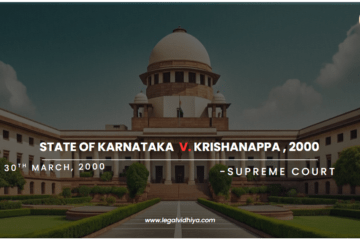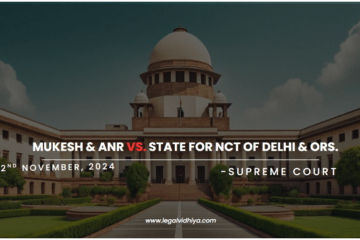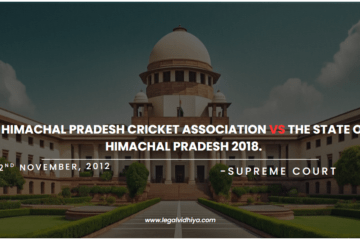
| CITATION | (2001) 7 SCC 487 |
| DATE OF JUDGEMENT | 31/08/2001 |
| COURT | SUPREME COURT OF INDIA(SC) |
| DEFENDANT | S. NAGALINGAM |
| RESPONDENT | SIVAGAMI |
| BENCH | D.P. MOHAPATRA & K.G. BALAKRISHNAN |
INTRODUCTION
In this case, the respondent initiated an appeal on criminal grounds with the High Court of Madras, stating that the decision of the learned District Magistrate was erroneous. The challenged judgement of the learned Sole Judge, who stated that the appellant committed the crime chargeable by Section 494 of the Indian Penal Code, is currently being heard by the proper court.
In this instance, the appellant is one of the individuals involved in the second marriage. Nagalingam and his purported second spouse, Kasturi, are both Tamil Nadu citizens, and their marriage took place at Thiruthani Temple in Tamil Nadu.
FACTS OF THE CASE
The appellant, S. Nagalingam married respondent-complainant Sivagami on 6.9.1970. Three children were born from that wedlock. The respondent alleged that the appellant started ill-treating her and on many occasions she was physically tortured. As a result of ill-treatment and severe torture inflicted by the appellant as well as his mother, she left her marital home and started staying with her parents. While so, the respondent came to know that the appellant had entered into a marriage with another woman on 18.6.1984, by name Kasturi, and that the marriage was performed in a Marriage Hall at Thiruthani. The respondent then filed a criminal complaint before the Metropolitan Magistrate against the appellant and six others. All the accused were acquitted by the trial court. Aggrieved thereby, the respondent filed criminal appeal No. 67 of 1992 before the High Court of Madras. The learned Single Judge, by his judgement dated 1.11.1996 upheld the acquittal of accused 2-7, but as regards the acquittal of the appellant, the matter was remitted to the trial court permitting the complainant to adduce evidence regarding the manner in which the marriage was solemnized. Upon remand the Priest, who is alleged to have performed the marriage of the appellant with the second accused, Kasturi, on 18.6.1984, was further examined and the appellant was allowed further cross-examination. The learned Metropolitan Magistrate by his judgment dated 4.3.1999 acquitted the accused. Aggrieved by the state judgment, the respondent preferred a criminal appeal before the High Court of Madras. By the impugned judgment, the learned Single Judge held that the appellant had committed the offence punishable under Section 494 IPC. This is challenged before us.
ISSUES RAISED
- Is it possible that the fundamental ingredients of the Section 494 offence were met in this case?
- Is “Saptapadi” a required ritual for the wedding celebration?
- Is the appellant’s second marriage on 18.6.1984 to the subsequent accused, Kasturi, a legal marriage under the Hindu Marriage Act, 1955?
CORRELATIONS OF CASES
The State of Tamil Nadu has added a State Amendment to the Hindu Marriage Act, 1955, and this extends to any wedding between two Hindus solemnized with the participation of family, friends, or other persons. The fundamental point of this clause is the fact that the involvement of a priest is not required for a legitimate marriage.
The witness testified that the bridegroom brought the “Thirumangalam” and tied it around the bride’s neck, that the garlands were exchanged, and that the father of the bride mentioned that He gave his daughter to “Kanniyathan” on behalf of and in the witness of “Agnidevi,” and that the acknowledgment of the same thing by the parent of the bridegroom effectively shows that the marriage was performed according to the traditions that applied to the parties.
CONTENTIONS OF PLAINTIFF
- The respondent, on the other hand, contended that per Section 7-A of the Hindu Marriage Act.
- The “Saptapadi” ceremony was unnecessary and that the second marriage took place in conformity with the customs and norms appropriate to both parties.
- The priest’s cross-examining confirmed this.
CONTENTION OF APPELLANT
- The appellant’s attorney asserted that the marriage was unlawful because “Saptapadi,” a Hindu marriage condition, was not met.
JUDGEMENT
The District Magistrate ruled that because an important and necessary rite known as “saptapadi” was not performed, the second marriage was illegal. The learned single judge of the High Court, in overturning the Magistrate’s decision, held that Section 7-A of the Hindu Marriage Act regulates both parties and that “saptapadi” is not required for a marriage to be considered valid, and thus S. Nagalingam is guilty of bigamy.
According to Sivagami’s complaint, the marriage was performed in accordance with Hindu law at RCC Mandapam in Thiruthani. She also said that the priest’s testimony was detailed and therefore it ought to be taken into account. The lawyer for the appellant, on the other hand, stated that “saptapadi is a significant ceremony and since it did not take place, the marriage cannot be considered valid.”
Held – The learned Single Judge was justified in ruling that the appellant committed bigamy, and the case was rightly remitted to the trial court for appropriate sentencing. This appeal has no merit, and it is thus dismissed.
Because Section 7-A applies to the parties, the personal laws applicable to the accused do not include “Saptapadi” as an essential ritual. As a result, the court determined that the accused and the second wife had a lawful marriage on July 18, 1984.As a result, it was determined that the appellant committed the crime of bigamy because he was still married to his first wife, whom he married on September 6, 1970.
CONCLUSION
This decision, in my opinion, was a landmark one because it restored the confidence of many women in the legal system when their partner marries again without severing links to the former husband. The top court in this instance surmounted the barriers imposed by religion, conventions, and rituals and showed the importance of justice. The Supreme Court has stated several times The Hindu Marriage Act states that rites and traditions are not required for marriage, however if there are any.The court will review the parties’ applicable customs in order to separate if the marriage is legitimate.
There are several gaps in the bigamy laws that the parties use to their advantage and the same has to be investigated. Hence, in situations like bigamy, there is a need for a uniform civil code. In order to offer the second wife’s rights legal protection and a sense of security under the law.
REFERENCES
- https://dejurenexus.com/wp-content/uploads/2021/05/Case-Analysis-of-S.-Nagalingam-Vs.-Sivagami-By-Sahajpreet-Kaur-Bhusari.pdf
- https://lawplanet.in/s-nagalingam-v-sivagami-case-summary-2001/
- https://mylegalpartner.wordpress.com/2018/05/21/s-nagalingam-v-sivagami/
This Article is written by Simran Haider Pathan, student at Balaji Law College of Pune, Maharashtra, Intern at Legal Vidhiya.




0 Comments